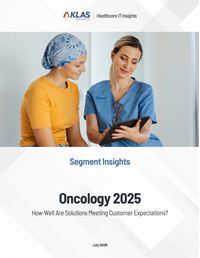 2026 BEST IN KLAS
2026 BEST IN KLAS
Preferences
Related Series
Related Segments


Oncology 2023
Market Dynamics Shifting for Medical and Radiation Oncology Information Systems
The market for both medical and radiation oncology EMRs is shifting. For medical oncology, many previously independent oncology practices and cancer centers have been consolidated into larger health systems, leading to the adoption of medical oncology modules from acute care EMR vendors—a trend that is set to continue. Additionally, customer satisfaction in the radiation oncology market has shifted in recent years as the two primary vendors have competed for each other’s customers. Leveraging the perspectives of 158 organizations, this report explores the performance of medical and radiation oncology EMR vendors to see which are meeting customer needs and which are falling behind.
Medical Oncology
Amid Market Consolidation, Epic Works to Build More Robust Oncology Functionality, Oracle Health (Cerner) Slow with Oncology Development
As hospitals, health systems, and large multispecialty organizations have acquired oncology practices and cancer centers, the hope for seamless integration has led to more adoption of acute care EMR vendors’ medical oncology modules. Respondents say Epic has made strides in collaborating with customers to develop Beacon and provide more robust oncology functionality. Recent developments, particularly around patient oncology history and treatment plans, have reportedly helped improve patient safety and better fit oncologists’ workflows. Respondents’ overall satisfaction with Epic is bolstered by positive experiences with strong technical support resources. Even with noted positive improvements, Beacon customers continue to report intensive initial builds and a steep learning curve due to the system’s complexity. One-fourth of those interviewed report workflow-related gaps they hope Epic will address in the future. Oracle Health (Cerner) customers view PowerChart Oncology as a customizable solution that, once built out, can meet organizational needs and integrate well with the Oracle Health suite. However, respondents are concerned about Oracle Health’s slow oncology development, and there has been less change in their overall satisfaction with PowerChart Oncology in recent years. Nearly half of those interviewed want improved workflows and order set functionality, noting that the system can be difficult to learn and use. Some respondents also report slow response times and variability in resource knowledge that detract from the overall support experience. Even with reported problems, customer loyalty remains high for both vendors—all Epic respondents and nearly all Oracle Health (Cerner) respondents would buy the solution again, citing the benefits of IT consolidation.

For Medical Oncology in Community Centers, Ontada (McKesson) and Flatiron Health Maintain Strong Performance with Intuitive Products and Responsive Support

Amid trends of practice consolidation, Ontada (McKesson) and Flatiron Health—the two vendors in this report primarily focused on medical oncology—have maintained a strong, largely satisfied customer base of mostly community oncology centers and outpatient clinics not directly owned by acute care organizations. Both Ontada and Flatiron customers say their vendor leverages oncology-specific expertise to tailor strong, intuitive web-based products. Ontada iKnowMed customers appreciate the straightforward workflows and oncology-specific functionality, particularly with regimen management. Respondents highlight their close vendor relationship, which is driven by responsive support teams and regular meetings with account managers who help improve system use and provide up-to-date notifications about system changes. On the other hand, there are concerns that Ontada’s development is falling behind; respondents want more automation, enhanced administrative reporting, and improved integration. Flatiron Health customers regularly point to OncoEMR’s product quality, ease of use, and ease of onboarding as the main drivers of satisfaction, particularly appreciating the efficient, oncology-specific workflows. Those factors, along with improved support responsiveness in recent years, have inspired high customer loyalty. Respondents would like Flatiron to improve their customer collaboration during development and provide enhanced administrative functionality.
For Medical Oncology, Elekta Customers See Strengthened Engagement; Varian (Limited Data) Customers Report Less Focus
Offering both medical and radiation oncology solutions, Elekta and Varian (limited data) perform well in radiation oncology (see next section). But because higher proportions of their medical oncology customer bases are owned or associated with an acute care organization, both have experienced higher vulnerability to replacement. Amid the fluctuating market dynamics, Elekta medical oncology customers say the vendor has worked to build better relationships and address enhancement requests. Customers continue to appreciate the system’s stability and robust capabilities, which reportedly meet most medical oncology needs. KLAS has validated one live cloud deployment of MOSAIQ, and several organizations are considering moving to the cloud. Respondents not using or considering using the cloud report that MOSAIQ’s technology feels old and that Elekta has fallen behind on delivering new features, leading nearly one-third of interviewed customers to plan to leave. Medical oncology customers using Varian (limited data) continue to appreciate ARIA’s oncology-specific functionality and note some recent improvements in support timeliness. Respondents’ core concerns are a lack of vendor engagement in driving the product forward and unstable upgrades. Additionally, some feel Varian focuses more on radiation technology, so their road map for medical oncology is unclear; as a result, four of the nine interviewed customers don’t plan to keep the system long term.

Radiation Oncology
For Radiation Oncology, Varian Customers See Overall Improvement; Elekta Customers Report Little Progress
In recent years, customer satisfaction with Varian’s radiation oncology EMR has consistently trended upward. Specifically, respondents appreciate improved response times and knowledge from support resources, enhancing the already-positive experience with the product driven by its ease of use and strong radiation oncology tools. Together these elements have inspired high loyalty to Varian. Customers enjoy the strong integration between Varian’s radiation oncology equipment and software, but some struggle to integrate ARIA with non-Varian products. Additionally, though reports of nickel-and-diming have recently decreased, 30% of interviewed customers still feel that everything from Varian comes with an extra charge. Elekta respondents have seen little change in their overall experience with radiation oncology. They continue to appreciate Elekta’s responsive, knowledgeable support team and feel the product meets most of their radiation oncology needs. Customers appreciate Elekta’s efforts to provide integration but are experiencing some difficulties integrating with non-Elekta solutions. Other concerns include slow responses to development requests and few upgrades that are aligned with customer needs. These concerns have weakened customer perception of the system’s value, and one-quarter of interviewed customers plan to leave.

About This Report
Each year, KLAS interviews thousands of healthcare professionals about the IT solutions and services their organizations use. For this report, interviews were conducted over an 18-month period (October 2021 to March 2023) using KLAS’ standard quantitative evaluation for healthcare software, which is composed of 16 numeric ratings questions and 4 yes/no questions, all weighted equally. Combined, the ratings for these questions make up the overall performance score, which is measured on a 100-point scale. The questions are organized into six customer experience pillars—culture, loyalty, operations, product, relationship, and value.

Sample Sizes
Unless otherwise noted, sample sizes displayed throughout this report (e.g., n=16) represent the total number of unique customer organizations interviewed for a given vendor or solution. However, it should be noted that to allow for the representation of differing perspectives within any one customer organization, samples may include surveys from different individuals at the same organization. The following table shows the total number of unique organizations interviewed for each vendor or solution as well as the total number of individual respondents.
Some respondents choose not to answer particular questions, meaning the sample size for any given vendor or solution can change from question to question. When the number of unique organization responses for a particular question is less than 15, the score for that question is marked with an asterisk (*) or otherwise designated as “limited data.” If the sample size is less than 6, no score is shown. Note that when a vendor has a low number of reporting sites, the possibility exists for KLAS scores to change significantly as new surveys are collected.


Writer
Carlisa Cramer

Designer
Bronson Allgood
This material is copyrighted. Any organization gaining unauthorized access to this report will be liable to compensate KLAS for the full retail price. Please see the KLAS DATA USE POLICY for information regarding use of this report. © 2026 KLAS Research, LLC. All Rights Reserved. NOTE: Performance scores may change significantly when including newly interviewed provider organizations, especially when added to a smaller sample size like in emerging markets with a small number of live clients. The findings presented are not meant to be conclusive data for an entire client base.












